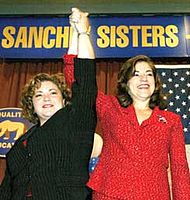Loretta and Linda Sanchez’s, the first Latina duo to serve in Congress, story first began in Mexico when a young couple, like other immigrant families, came to United States for a piece of the American dream. A matriarchal run household heavily influenced the Sanchez sisters and their 5 siblings. Their mother who despite not receiving herself a formal education in her youth worked as a teacher’s aide when the children attended school and instilled a love for education in the Sanchez sisters at a very young age. Maria Sanchez, their mother entered college and graduated in her forties thus, proving that it is never too late to get an education. However, their parent’s strong community activism shaped the sisters political careers and ideology. Their mother was an activist on behalf of immigrant families and their father was a unionized machinist. The sister’s hunger for success and change derives from their hard working family and the struggles they’ve had to face.
Loretta Sanchez, the eldest sister, received her MBA from American University and prior to congress worked as a financial analyst. Despite her success she recalled being a “shy, quiet girl” who did not speak English. She grew up poor and suffered from a speech impediment but those hardships made her even more passionate. In the Latino Community, language barriers prevent access to resources and opportunities because of a lack of knowledge that can be easily improved through education. Today, Loretta is the U.S. Representative for California’s 47th congressional district. On the other hand her sister Linda Sanchez began her career differently, she received her Juris doctor from UCLA and worked as a labor organizer. Then in 2003, Linda became the U.S. Representative for California’s 39th congressional district. Both sisters are strong advocates of families, which is very important to the Chicano/a movement. In addition, access to quality education and affordable health care are also big issues on their agenda, which greatly affect the Latino community. Most of all support for labor unions has been an issue close to their heart due to their upbringing and the culture they were surrounded by. The causes they support are a reflection of their lives. This resonates with the experiences of Chicana Feminists in their home life. Their interest in activism and awareness of issues grew out of the injustices they witnessed at home and in their community, especially the prevalent sexist attitudes and patriarchal society that oppressed women.
The Sanchez sister’s road to Congress has not been easy. Their struggles are documented in a joint memoir called “Dream in Color: How the Sanchez Sisters Are Making History in Congress,” in which they share the difficulties of being a minority in a white dominated institution, Congress and politics. They face multiple oppressions because of their race and gender however, they have overcome them with resilience. Their oral histories are compiled in childhood vignettes throughout the book, which help to create a very unique memoir. It also assists to combat the idea of the stereotypical politicians because the Sanchez sisters acknowledge their roots and incorporate experiences in shaping their politics. Even though they are Congresswomen of the 21st century like many Chicana Women of the 60s, they continue to face gender stereotypes, which have been used to weaken them as politicians. Linda shares in the memoir that “without a doubt, there are certain members of Congress who still believe women don’t belong there, and there are those who see women just as sexual objects,” echoing what women encountered in the 1969 Chicano Youth Liberation Conference in Denver, Colorado. Chicano men only wanted women by their side as secretaries and in minor roles but never in leadership roles that could possibly threatened their power. There was a similar power struggle in a recent controversy in which Loretta quit the Congressional Hispanic Caucus after she accused the caucus chairman, Rep. Joe Baca, D-Calif., of calling her a “whore” which contributes to the “vendida” logic about women, mentioned in ¡Chicana Power! It also shows how Latino men continue to oppress women with the virgin/whore dichotomy as a strategy to decrease their power in organizations and make women believe they are inferior to their male counterparts. Furthermore Loretta adds that “male superiority is very deeply ingrained in some Latino men of a certain generation,” which was seen through the Chicano Movement and in conferences that discussed the goals and priorities of the movement that only benefitted men and neglected women. Sexist attitudes are very present in politics, but the Sanchez sisters have learned that in solidarity women can overcome struggles. They are making history as women and most of all as women of color because they are challenging patriarchal institutions by enacting change and remaining true to their origins.
References:
- Blackwell, Maylei. ¡Chicana Power!: Contested Histories of Feminism in the Chicano Movement. Austin: University of Texas, 2011. Print.
- Curphey, Shauna. “Sanchez Sisters to Make History in the House.” Women’s ENews. 19 Nov 2002. Web. 12 Feb. 2012 <http://www.womensenews.org/story/washington-outlookcongresswhite-house/021119/sanchez-sisters-make-history-the-house>.
- Sanchez, Linda, Loretta Sanchez, and Richard Buskin. Dream in Color: How the Sánchez Sisters Are Making History in Congress. New York: Grand Central Pub., 2008. Print.
- Press, The Associated. “Sanchez Sisters Recount Obstacles Getting to House in Joint Memoir.” NY Daily News. Web. 14 Aug 2008. Web.12 Feb. 2012.<http://www.nydailynews.com/latino/sanchez-sisters-recount-obstacles-house-joint-memoir-article-1.313528>
- http://en.wikipedia.org/wiki/Linda_Sánchez
- http://en.wikipedia.org/wiki/Loretta_Sanchez
- Image: http://en.wikipedia.org/wiki/File:Sanchez_Sisters.jpg
